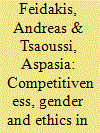|
|
|
Sort Order |
|
|
|
Items / Page
|
|
|
|
|
|
|
| Srl | Item |
| 1 |
ID:
091738


|
|
|
| 2 |
ID:
139510


|
|
|
|
|
| Summary/Abstract |
Our intention is to demonstrate, based on research, which elements support teamwork in HUMINT, or alternatively to show the advantage of using traditional intelligence methods. We conducted research among the operational intelligence officers of the intelligence services of Bosnia and Herzegovina, Montenegro, and Slovenia. These intelligence services, which evolved in the 1990s, witnessed the disintegration of the Socialist Federal Republic of Yugoslavia (SFRY) in 1992 and the establishment of new countries in the Balkan region, along with experiencing the area's cruelest wars. The Republic of Slovenia, the first to gain independence from the SFRY, was also the first to become a member of the European Union (EU) and North Atlantic Treaty Organization (NATO). Bosnia and Herzegovina underwent a terrifying war. The Dayton Agreements set the elements for the establishment of the new country's intelligence community but today “Dayton” clearly needs an appropriate update. Montenegro, a country with a long tradition, was not directly entangled in the Balkan wars of the ‘90s. Due to its geo-strategic position, however, its territory and inhabitants were often a logistics base or a refuge for various paramilitary groups and individual war criminals, whether in the direction of western Bosnia and Herzegovina or towards northeast Kosovo.
|
|
|
|
|
|
|
|
|
|
|
|
|
|
|
|
| 3 |
ID:
155297


|
|
|
|
|
| Summary/Abstract |
The study examines the effect of noncognitive skills on early career choices among young job seekers. Specifically, we analyze the influence of personality traits on the decision by military applicants either to choose the military or a civilian career option. We use a unique micro-level data-set of applicants to the US Navy and exploit the fact that many individuals who initially apply for military jobs eventually choose civilian careers instead. In this institutional setting, job candidates use new information to update their beliefs about the military job match. Personality traits are viewed as productive abilities that influence applicants’ expectations about the economic return to the job and occupational training offered by the Navy. The study finds that many of the 15 lower order personality facets associated with the Big Five traits are predictive of applicants’ job choices and provides suggestive evidence of a link between personality traits, job match expectations, and career choice.
|
|
|
|
|
|
|
|
|
|
|
|
|
|
|
|
| 4 |
ID:
077421


|
|
|
|
|
| Publication |
2007.
|
| Summary/Abstract |
This article examines the effects of personality traits on attitudes toward foreign policy issues among the German public. Building on previous research, it argues that personality characteristics shape an individual's motivation, goals, and values, thereby providing criteria to evaluate external stimuli and affecting foreign policy opinions. An analysis of survey data from a random sample of Germans eligible to vote confirms that the personality traits play a role in attitudes toward foreign policy issues. By and large, personality affects foreign policy opinions roughly as strongly as traditional factors such as partisanship, ideology, and social background. Among the traits studied, agreeableness and openness render persons more supportive of international cooperation and more skeptical of the use of military force, whereas conscientiousness exhibits reverse effects. Thus, personality traits merit serious attention in analyses of public opinion on foreign policy.
|
|
|
|
|
|
|
|
|
|
|
|
|
|
|
|
|
|
|
|
|